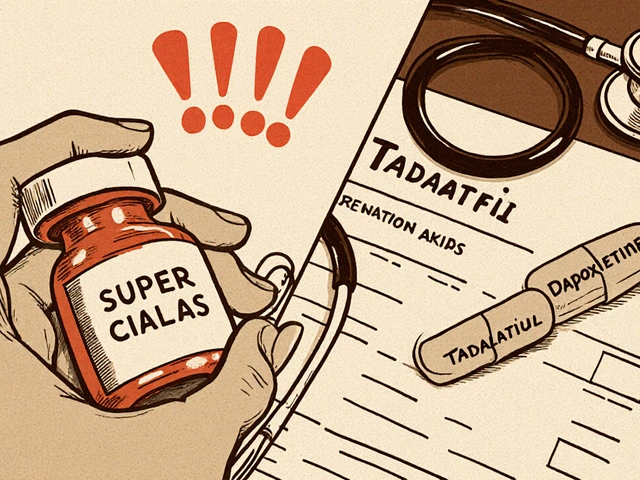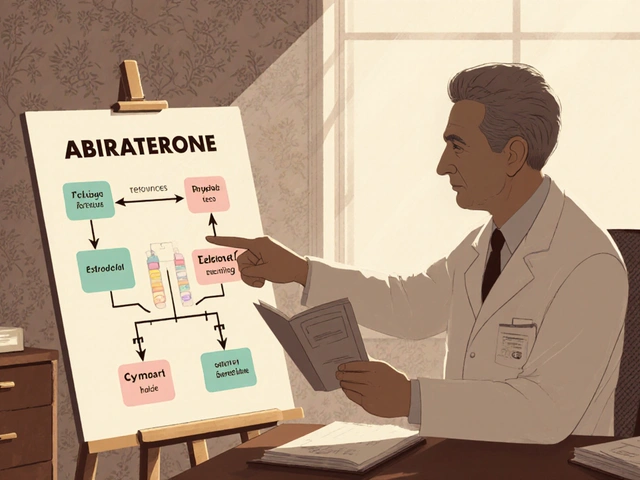If you’ve ever had your day hijacked by a sudden, urgent sprint to the toilet, you know how desperate things can get. It happened to me once before a live football match here in Manchester. I almost missed kickoff. You don’t forget that kind of panic. Imodium is that small green-and-white box in every pharmacy, promising to get your bowels back on track fast. But is it as simple as popping a pill? Loads of people rely on it, but very few know exactly what it does or when you actually should—or shouldn’t—use it. Get ready to separate hard facts from dodgy advice your aunt gives you.
What Is Imodium and How Does It Work?
Imodium, also known by its generic name loperamide, is the world’s go-to diarrhoea stopper. If you check the label on those classic green boxes, that’s the name you’ll see tucked away in the ingredients. What’s loperamide, then? It’s a synthetic substance developed in the early 1970s, originally meant to treat various gut disorders.
Here’s where it gets interesting: Imodium doesn’t magically firm things up by killing off germs or mopping up fluids—it works by slowing down the movement of your gut muscles. Your intestines have a rhythm, almost like a conveyor belt moving stuff along. Diarrhoea happens when that conveyor belts speeds up thanks to infection, stress, dodgy curry, or some other trigger. Loperamide gently persuades those gut muscles to chill out, giving your large intestine more time to absorb water back into your body. The result? Firmer stools, fewer mad dashes, less misery.
It’s not just for adults, either. There are paediatric versions for kids over 12 years old, with smaller doses. But if you’re dosing up children, always check with your GP first. According to the NHS, adults usually start with two capsules after a loose stool, then one pill after each watery motion, maxing out at eight per day. Don’t go thinking more is always better. Overdoing it can make things worse, sometimes way worse. If you want to know how common diarrhoea is, it hits about 1 in 5 Brits every year, and Imodium sales are staggering worldwide, crossing over 250 million packs sold each year.
Common Uses for Imodium (And When Not to Use It)
Most people reach for Imodium when they’re hit with a spell of acute diarrhoea—usually the kind that comes from a mild tummy bug, stress, or food that just doesn’t agree with you. Maybe you’re travelling to Spain and worried about ‘holiday tummy’ (also called traveller’s diarrhoea). Maybe it’s a work meeting you can’t miss. Imodium’s appeal is obvious—no one wants to be running to the loo on a flight or during your kid’s school play.
But there’s a catch: Imodium isn’t always the answer. If you’ve got a fever, blood in your stool, or severe abdominal pain, Imodium can actually make things worse. Infections that crank up your gut sometimes need to, well, get out of your system. Blocking things up traps those germs inside and can lead to complications, especially if bacteria like Salmonella, Shigella, or E. coli are behind your misery. The World Health Organization makes it clear: don’t use loperamide if you think there could be a bacterial gut infection, and never use it for young children under 12 without medical supervision.
Imodium also shows up as a helper for people coping with chronic conditions, like irritable bowel syndrome (IBS), where diarrhoea can turn daily life into a guessing game. Doctors sometimes suggest small doses in this setting, but always tailored to the person. The situation is different for people with chronic inflammatory conditions like Crohn’s or ulcerative colitis. It can cause pretty serious issues if used during active flares.
| When to Use Imodium | When to Avoid Imodium |
|---|---|
| Acute mild diarrhoea (no fever or blood) | Fever, blood/mucus in stool |
| Traveller’s diarrhoea (if not severe) | Suspected bacterial/gut infection |
| Irritable bowel syndrome (on doctor’s advice) | Children under 12 (unless prescribed) |
| Runny guts after certain food intolerances | Active Ulcerative Colitis or Crohn’s flare |

Side Effects and Safety—What You Really Need to Know
Mention ‘side effects’ and most people imagine dramatic warnings—but Imodium is usually pretty well-tolerated. Still, you don’t want to be surprised, especially if you rely on it during travel or busy days. Some folks feel a bit bloated, a bit gassy, or get mild cramps soon after taking Imodium. Here’s a surprising stat: less than 2% of people report serious side effects, but you never want to ignore them.
One of the sneakiest risks? Taking too much. Overuse can cause constipation so severe you might need medical help. It’s more common than you’d think among people desperate for relief. An overdose can also trigger heart rhythm problems—which isn’t just theoretical. In the last decade, doctors noticed a rise in young adults overdosing on loperamide in attempts to self-treat withdrawal from opioid drugs—sometimes leading to dangerous, even fatal, heart issues.
Here’s a shortlist of possible side effects, ranked from common to rare:
- Mild constipation
- Dry mouth
- Nausea
- Abdominal cramps
- Fatigue, or drowsiness
- Rare: Severe constipation, allergic reactions, irregular heartbeat
If you feel faint, notice irregular heartbeat, or have trouble peeing after taking Imodium, get medical help quickly. And if you’re on other meds—especially antibiotics, HIV drugs, or heart meds—ask your pharmacist before taking loperamide. The packaging will say ‘see your doctor if diarrhoea lasts more than 48 hours,’ and that’s not just legal fine print. Prolonged symptoms could mean something more serious is going on.
Pregnant or breastfeeding? According to NHS guidelines, Imodium is usually avoided unless absolutely necessary and approved by your doctor. It doesn’t generally pass through breastmilk in worrying amounts, but err on the side of caution and check with a professional.
Smart Tips for Using Imodium Effectively
Getting the most from Imodium is easier than it seems. There are a few golden rules. First, only use it for short-term diarrhoea, unless your doctor says otherwise. Don’t treat diarrhoea from antibiotics or strong gut infections with Imodium unless you’ve checked with your GP. If your diarrhoea is the typical, sudden ‘oh no’ type (say, a dodgy burger at your mate's barbecue), Imodium can get you out of a jam within hours.
Stay hydrated—this isn’t optional. Diarrhoea depletes your fluids and electrolytes. Even if things stop, your body still needs a top-up of water and some salts (think oral rehydration salts, or a sports drink if that’s all you’ve got). The NHS recommends sipping water regularly and adding a pinch of salt and a teaspoon of sugar per litre if you need to DIY rehydration.
Most people feel improvement within a few hours. If you’re not better in two days, it’s time for a check-in with a doctor. Don’t keep dosing up and hoping for a miracle. And remember: diarrhoea is sometimes your body’s signal to slow down, rest, and let things heal. Don’t plough on with work and plans as if nothing happened—give yourself a break.
- Never exceed the maximum recommended dose (usually 8 caplets per day for adults)
- Keep a small pack in your travel kit: UK airports sell travel-sized Imodium for a reason
- Store Imodium at room temperature, away from heat—don’t leave it baking in a hot car
- Always check expiry dates; loperamide loses effect after expiry
- Let someone know if you’re being hit with ongoing diarrhoea, especially in hot weather or when travelling alone
And if you have pets like my cat Fennel, remember—never, ever give human anti-diarrhoea meds to animals. Cats and dogs have very different systems, and you can do more harm than good. Trust the vet.

When Diarrhoea Means Something Else (And What to Do)
Sure, most cases of diarrhoea are just annoying—your body’s reaction to bad food or too much stress. But not every episode is harmless, and some signs mean you shouldn’t just shrug it off or grab the Imodium.
If you notice any of these, hit up your GP, NHS 111, or an urgent care centre quickly:
- Blood or mucus in your stool (not normal!)
- Severe tummy pain, especially around your lower right side (could be appendix or other serious stuff)
- High fever that won’t budge (over 38°C for more than a day)
- Black or tarry stools (sometimes a sign of internal bleeding)
- Signs of dehydration, like dry mouth, confusion, zero urine output, especially in kids or older folks
Chronic diarrhoea (lasting more than a week) means your gut needs a bit more attention. Maybe it’s IBS. Could be a food intolerance. In Manchester, doctors are big on ruling out things like coeliac disease, lactose intolerance, or even bowel cancer if you’re over 50. Your GP will probably recommend blood tests, stool samples, or maybe a camera test. Modern medicine—sometimes it’s not glamorous, but it works!
| Symptoms with Diarrhoea | May Indicate | Action |
|---|---|---|
| Blood in stool | Infection, inflammation, or internal bleeding | See GP/urgent care |
| Severe abdominal pain | Appendicitis/obstruction | Immediate medical attention |
| Black/tarry stool | Bleeding in digestive tract | Urgent evaluation |
| Long-lasting diarrhoea (>7 days) | Chronic condition (IBS, IBD, allergy) | See GP |
Kids, older adults, and anyone with a weak immune system are particularly at risk for dehydration. Sometimes Imodium isn’t just unnecessary—it’s unsafe. For them, medical advice comes first, before you reach for any quick fixes.
So, next time you see those neat rows of Imodium at Boots or your local co-op, you’ll look at them differently. The reputation is deserved—it works. But it’s not a magic fix for every upset gut, and there’s an art to knowing when it fits and when to leave it on the shelf. Trust your gut (pun intended), listen to your body, and keep these facts close when the next stomach disaster hits.









Write a comment
Your email address will be restricted to us